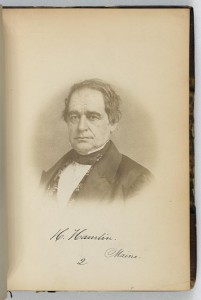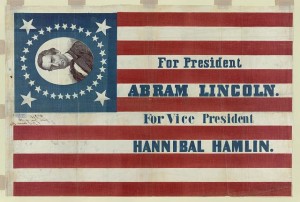Yesterday morning I was reading a review of Robert Caro’s latest book on the life of Lyndon B. Johnson. Daniel Patrick Moynihan is said to have described LBJ’s descent from Senate Majority Leader to the sideline job of vice-president as like a “bull castrated very late in life”. That got me thinking about the man elected vice-president 100 years before Johnson. I’ve seen very little about Hannibal Hamlin since before President Lincoln’s inauguration.
There is an excellent biography of Hamlin at the United States Senate site. Although not majority leader, Hamlin was serving in the U.S. senate when he was elected as vice-president. He bemoaned his loss of power and patronage:
When the Senate convened on the Fourth of July in 1861 to take the legislative actions necessary for raising and funding an army for the Union, Vice President Hamlin discovered that he had far less power and patronage as vice president than he had as a senator. The loss of patronage particularly galled Hamlin, who was “noted for his fidelity to political friends.” He also felt unhappy over being relegated to serving as an inactive observer of events. Hamlin considered himself the most unimportant man in Washington, ignored equally by the administration and the senators. He called his job “a fifth wheel on a coach” and identified the vice president as “a contingent somebody.”
He considered his job a “nullity” and was so bored presiding over the senate that he often left for Maine well before the end of a session.
(The same site says that Hamlin pushed Lincoln to issue an Emancipation Proclamation. Lincoln asked Hamlin to dinner to show him a first draft and asked for his Veep’s suggestions.)
One of the things I’ve enjoyed about working on this site so far is the unexpected pleasures. One I especially liked was the sleigh procession that escorted Mr. Hamlin to the railroad station in Bangor, Maine as he began his trek to Washington to take up his job as vice-president. I loved the intertwining of the two technologies – from horse power to steam power. I got sentimental thinking about the outpouring of support for the native son. But the article at the senate site kind of rounded out the story – maybe some of those supporters were looking for a federal gig. As it turned out, a vice-president did not have too much patronage power because, as Hamlin himself explained:
“Every member who has a constituency, and every Senator who represents a state, counts for more in his own locality, and with the Executive who must needs, in wielding the functions of his office, gather around him, and retain by his favors, those who can vote in Congress and operate directly upon public sentiment in their houses.”



![Free speech, free soil, free men. This is to certify that [blank] is a member of the [blank] Wide-awake Club (Gavit & Co., 114 Broadway, New York, c1860; LOC: C-DIG-ppmsca-19788) Free speech, free soil, free men. This is to certify that [blank] is a member of the [blank] Wide-awake Club (Gavit & Co., 114 Broadway, New York, c1860; LOC: C-DIG-ppmsca-19788)](https://www.bluegrayreview.com/wp-content/uploads/2012/05/19788r.jpg)